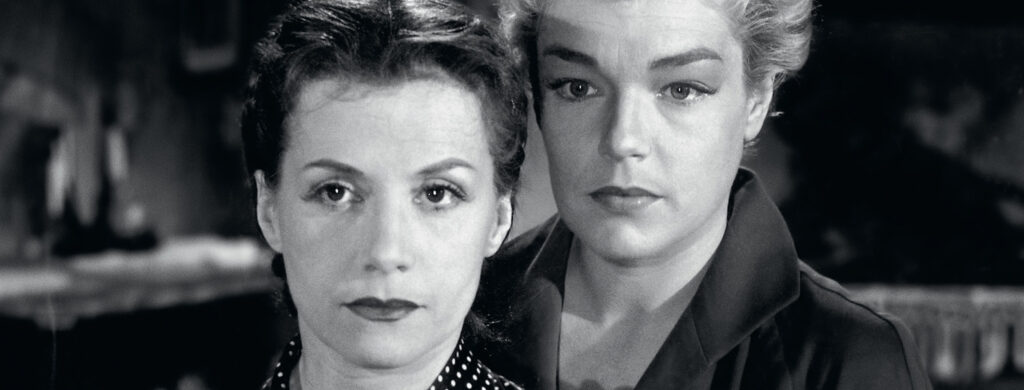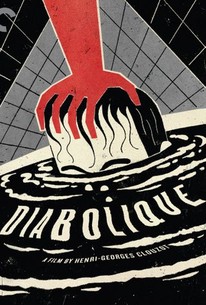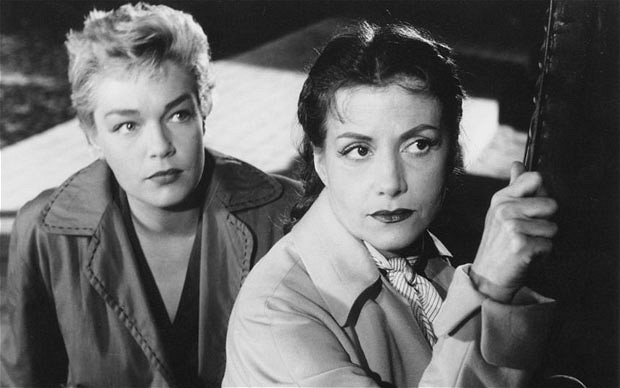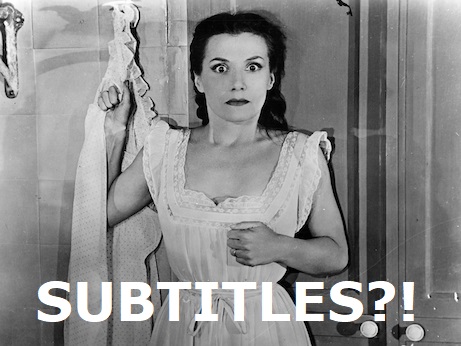
Les Diaboliques, the 1955 French classic, doesn’t entirely fit the usual criteria for what constitutes a horror film, and yet, it’s not uncommon to see it on prominent best-of-horror lists. It’s a psychological thriller, and a damn effective one, but to explain its reputation as a defining film of the horror genre, I’d have to dive head-first into mega-spoiler territory.
Les Diaboliques (or Diabolique, as it is perplexingly renamed for English-speaking markets) is one of those pre-1960s films charged with inspiring Hitchcock’s Psycho, and if you’ve heard of this film, that’s probably why. In spite of a dramatically dissimilar story, there’s plenty of evidence for the alleged inspiration. Robert Bloch, author of the novel Psycho was based on, was a vocal fan of the film, Hitchcock lost a bidding war for the rights to adapt the novel Les Diaboliques is based on, and the film contains a message at the end begging audiences not to reveal the shocking ending to their friends, which sounds awfully similar to Hitchcock’s advertising gimmicks for Psycho.
Even though it will forever live in Psycho’s shadow, Les Diaboliques is still a classic in its own right.

Directed by Henri-Georges Clouzot, best known for that film school must-see The Wages of Fear, Les Diaboliques is about a couple, Michel and Christina, who run a shitty boarding school in Paris. Michel is notably cruel to the school’s pupils, and everyone in his general vicinity. His wife Christina feels trapped in their sham of a marriage, wanting desperately to avoid the scandal of divorce.
Michel is having a not-so-secret affair with Nicole, a teacher at the boarding school. This scenario is approached in a shockingly nonchalant way by the other characters, which is probably due to some outdated cultural norm I’m not familiar with as a filthy American. She seems to have something of a friendship with Christina, and the two bond over their frustrations with Michel. They form a suspiciously complicated plan to murder Michel, and the rest of the film focuses on how this plays out.
In the tradition of honoring Clouzot’s request to refrain from spoilers, this is as far as I can go regarding plot synopsis. As you’ve likely gathered by now, Les Diaboliques ends with a massive, game-changing twist.
If you were alive and in touch with other human beings in 1999, you probably remember the praise for M. Night Shyamalan’s The Sixth Sense. That film has a game-changing twist, and fans generally recommend watching it at least twice to get the most out of what it has to offer. Now that we as the audience know that *not even worried about spoiling The Sixth Sense* Bruce Willis has been dead throughout, there are many instances in earlier parts of the film that foreshadow this outcome. For example, Willis has whole conversations with characters who never answer his questions directly, and his wife, who at first seems frustrated with their relationship, is actually grieving his loss. After seeing Les Diaboliques a second time, I’d say it deserves multiple viewings in a way Shyamalan could only have dreamed of achieving.
The twist in Les Diaboliques is fairly shocking, but what shocked me even more were my second and third viewings. Clouzot masterfully fosters a sense of certainty in the audience regarding where the film is going, and where it will ultimately end. However, subsequent viewings reveal not only how thoroughly he manipulates the viewer, but how much knowing the ending changes the narrative entirely. It’s not nearly as straightforward as The Sixth Sense, and there’s plenty of subtle ambiguity around the actual events of the film. The ambiguous aspects are just subtle enough to avoid being frustrating.
Also, Les Diaboliques respects you enough to refrain from the need to montage back to all of the scenes the twist applies to. This would in theory be one hell of a montage, because you’d have to recap the entire damn movie.
Unlike The Sixth Sense and its imitators, re-watching Les Diaboliques isn’t about focusing on easter eggs scattered throughout. Instead, we’re charged with deciphering the behaviors and motivations of each character. This is so well-executed, emotionally complex, and thought-provoking that even though I vividly remembered the ending, I was never disengaged, and I never felt like I was trivially revisiting the film in order to pick up on aforementioned easter eggs.
This feat owes much to the acting in the film. Christina is actually played by Véra Clouzot, the real-life wife of Henri-Georges. Her face is hauntingly expressive at times, and her ability to quickly shift moods in a natural way cleverly reflects her character’s fragile mental state. Paul Meurisse (Michel) is also notable for similar reasons. The beautiful Nicole (Simone Signoret) is a stubborn, expressionless character who often approaches extreme situations with uncanny repose, but as Clouzot builds mistrust in his audience’s certainty regarding her motivations, she becomes far more elusive and complex.

Les Diaboliques is also surprisingly funny. Many of the side characters provide the comic relief, but more interestingly, it’s uncertain if Michel’s deplorable behavior is actually supposed to be funny, as it is quite over-the-top. I found myself laughing out loud or chuckling to myself at least every few minutes.
A few final things to consider:
- There is a dubbed version of this film. The perceived inconvenience of subtitles is still far better than this trash heap of a dub. Don’t even bother.
- It was remade as Diabolique in 1996. I’m sure Sharon Stone drinks herself half to death every night just to forget about the remake’s existence.
- While I love its deliberate pacing, it’s a bit on the slow side.
This is certainly one of the most evasive reviews I’ve ever written, so if you’re a bit confused about what makes this such a great film…good. As is the case for most classic French films, there’s a wonderful Criterion release just begging to adorn your shelf.
And if your first thought upon noticing the title of this film was in French was…

…Give it a try anyway.
10/10